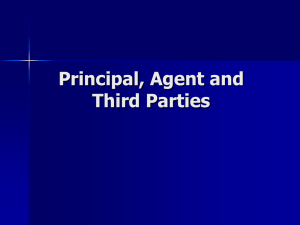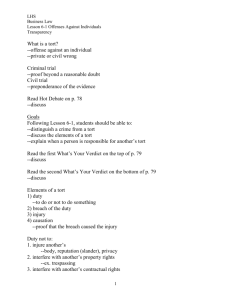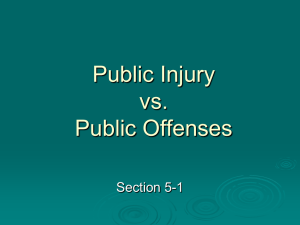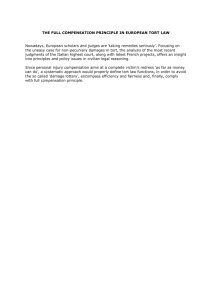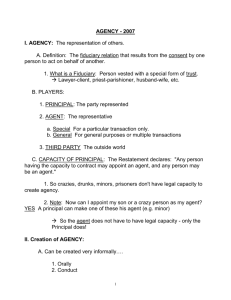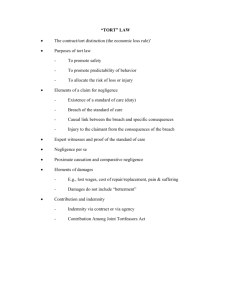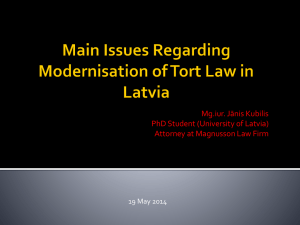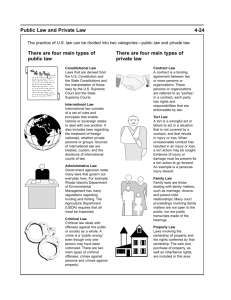Slides: Chapter 1
advertisement
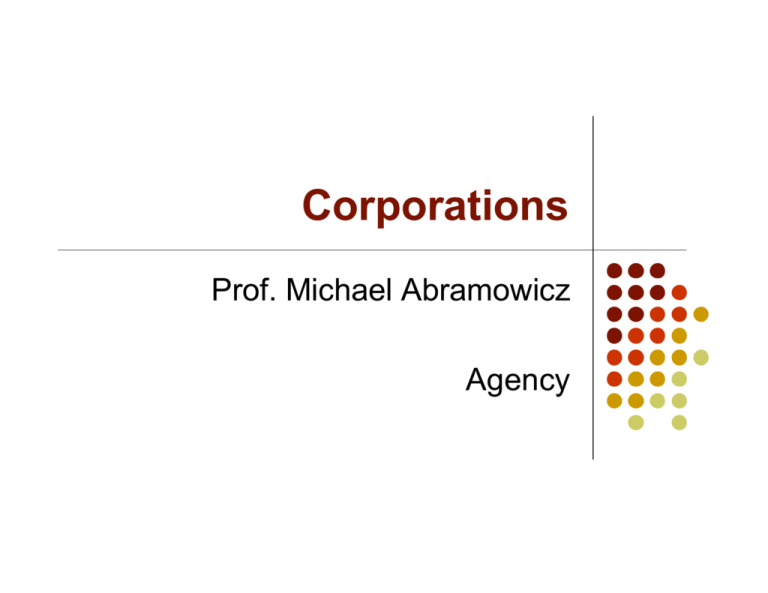
Corporations Prof. Michael Abramowicz Agency Agency Defined: Gorton v. Doty l l Facts Questions l l l What was the issue in this case? Why did it matter? Issues l Legal standard to create agency relationship? l l l Manifestation of consent by P Consent by agent Evidence in this case? (c) 2004 2 The PAT Triangle (1) P A (2) (1) Agency relationship between P and A (3) (2) A’s dealings with T (3) Create legal liability of P to T (and viceversa) T (c) 2004 5 A Gay Jenson Farms v. Cargill l l l l What was relationship? Did that amount to agency? (Apply the definition.) Does servant-independent contractor distinction matter here? When does a creditor become a principal? How about a supplier? (c) 2004 14 Define an agency relationship l Restatement § 1(1) l A manifestation of consent by one person (the principal) that another person (the agent) act: l l l On the principal's behalf; and Subject to the principal's control The agent's consent to so act (c) 2004 21 Controlling Creditor l Restatement § 14 O: When does a creditor become a principal? l l Creditor becomes a principal at that point at which it assumes de facto control over the conduct of the debtor Nine factors re control (c) 2004 30 Supplier l Restatement § 14K: l One who contracts to acquire property from a third person and convey it to another is the agent of the other only if it is agreed that he is to act primarily for the benefit of the other and not for himself. (c) 2004 31 Principal’s Liability in Contract l Restatement § 144: a principal “is subject to liability upon contracts made by an agent acting within his authority if made in proper form and with the understanding that the principal is a party” (c) 2004 43 Authority: Actual or Otherwise l Agents acting with authority may bind principals l l Authority is the starting point for analysis of contract actions Authority also is an element in vicarious liability-based tort actions against the principal (esp. the “scope of employment” requirement) (c) 2004 45 Flavors of Authority l Actual l l l l l l Actual express Actual implied Apparent Inherent Also: l l Do the legal consequences of an agent’s acts depend on the type of authority the agent possessed? Estoppel Ratification (c) 2004 47 “Actual Authority” l Actual authority requires a “manifestation of consent” from the principal to the agent P A T (c) 2004 51 “Manifestation of Consent” “authority to do an act can be created by written or spoken words or other conduct of the principal which, reasonably interpreted, causes the agent to believe that the principal desires him so to act on the principal’s account” Restatement § 26 (c) 2004 52 “Actual Authority” l l May be express or implied Implied authority is highly contextual, often depending on prior practices or industry customs l E.g., “incidental authority,” which includes the authority to do those things that usually accompany or reasonably necessary to the actions authorized (c) 2004 53 Mill Street Church v. Hogan l l l l Who is the principal and who is the agent? What is the relationship of Sam Hogan and the Church? Was there express authority here? Implied authority? Is Sam’s belief relevant to determining whether actual authority existed? (c) 2004 54 “Apparent Authority” “Apparent authority is the power to affect the legal relations of another person by transactions with third persons, professedly as an agent for the other, arising from and in accordance with the other’s manifestations to such third persons.” Restatement § 8 (c) 2004 58 Apparent Authority P A A could be P’s actual agent (w/ or w/o actual authority) or P’s apparent agent Manifestation by P to T T (c) 2004 60 Lind v. Schenley l Facts l l l l Who allegedly told whom what? How does apparent authority differ from actual authority? How does implied apparent authority differ from express apparent authority? What was P&T’s “manifestation” to Lind? How could P&T have avoided this problem? (c) 2004 61 370 Leasing l Facts l l What is the relationship between Joyce and Kays? Between Kays and Mueller? Between Mueller and the company? Questions l l l On what type of authority is Joyce relying. And why? What were Ampex’s manifestations? To what extent do Kays’s manifestations count as Ampex’s manifestations? (c) 2004 67 Inherent Authority l Restatement calls it “inherent agency power”: l l “Inherent agency power is a term used in the restatement of this subject to indicate the power of an agent which is derived not from authority, apparent authority or estoppel, but solely from the agency relation and exists for the protection of persons harmed by or dealing with a servant or other agent.” Restatement § 8A. This is something of a catch-all provision, applicable when other forms of agency won’t do the work. (c) 2004 75 Watteau v. Fenwick: The Case of the Undisclosed Principal l Facts l l Questions on case l l l l l Why was Humble’s name on the door to the tavern? Did Humble have actual authority? Did Humble have apparent authority? Was Fenwick in some way relying on Watteau’s existence? Did Humble have inherent authority? Policy issue: What policy rationale explains Watteau? (c) 2004 78 In undisclosed principal cases, what is the scope of the agent’s authority? l Watteau: l l “the principal is liable for all the acts . . . which are within the authority usually confided to an agent of that character” Restatement § 195 l “agent enters into transactions usual in such business and on the principal's account” (c) 2004 84 Kidd: The Case of the Disclosed Principal l Facts l l What is the connection from Edison to Kidd? Questions l l Implied actual authority? Implied apparent authority? l l What is the holding out? Should putting Fuller in the position to make a representation be enough? (c) 2004 86 Nogales l Facts l l l What representation was allegedly made? What happened? Issues l l l Does the court dismiss the theory of inherent authority? What is the technical issue on which this case is resolved? What would Terpenning need to prove? What would Terpenning not need to prove? (c) 2004 90 Restatement § 8A l l Definition: “Inherent agency power is … the power of an agent … derived … solely from the agency relation and exists for the protection of persons harmed by or dealing with a servant or other agent.” Rationale: Three situations in which principal may become liable l General agent does typical type of activity, but in violation of orders l Agent acts for his own purposes in entering into a transaction which otherwise would be authorized l Agent is authorized to dispose of goods and departs from the authorized method of disposal. (c) 2004 92 Restatement § 161 l “A general agent for a disclosed or partially disclosed principal subjects his principal to liability for acts done on his account which usually accompany or are incidental to transactions which the agent is authorized to conduct if, although they are forbidden by the principal, the other party reasonably believes that the agent is authorized to do them and has no notice that he is not so authorized.” (c) 2004 93 Ratification l l l A acts without authority (of any kind) and there is no grounds for estoppel. P will only be bound if P ratifies the contract Ratification requires l l A valid affirmation by P To which the law will give effect (c) 2004 97 Ratification l Affirmation l l l Can be express or implied Principal must know or have reason to know all material facts Will be denied legal effect where necessary to protect the rights of innocent third party (c) 2004 98 Botticello v. Stefanovicz l Facts l l l What did Mary observe? What did Mary know? Holding l l Enough for ratification? Why or why not? Remedy? (c) 2004 100 Distinguish Ratification from Actual Authority Created by Acquiesence “(1) Acquiescence by the principal in conduct of an agent whose previously conferred authorization reasonably might include it, indicates that the conduct was authorized; if clearly not included in the authorization, acquiescence in it indicates affirmance. (2) Acquiescence by the principal in a series of acts by the agent indicates authorization to perform similar acts in the future.” Restatement § 43 (c) 2004 105 Estoppel: Hoddeson v. Koos Bros. l l Facts Issues l l l Why no apparent authority? Is failure to police sales floor the requisite manifestation? On remand, what will Hoddeson have to prove to make out a case of estoppel? (c) 2004 106 Agent Liability on the Contract l Disclosed Principal l l None Two exceptions l l Clear intent of all parties that agent be bound Agent made contract but without authority § § § Party to the contract? Fraud? Implied warranty of authority (c) 2004 111 Atlantic Salmon l Facts l l l What was Boston Seafood Exchange? What’s a fictitious name? Issues l l Is the agent liable? Why or why not? Should we blame the creditor here for not doing enough of a credit check? (c) 2004 113 Vicarious Liability l l “For whoever employs another, is answerable for him, and undertakes for his care to all that make use of him. The act of a servant is the act of his master, where he acts by authority of the master.” Jones v. Hart (1698) “A master is subject to liability for the torts of his servants committed while acting in the scope of their employment.” Restatement (Second) § 219(1) (c) 2004 115 Terminology Archaic Modern Restatement 3d Servant Independent Contractor (agent-type) Independent Contractor (nonagent) Employee Nonservant agent Nonagent independent contractor Employee Nonemployee agent Nonagent service provider (c) 2004 116 Independent Contract Types l Nonservant agent (a.k.a. agent-type independent contractor) l l l Subject to limited control by P with respect to the chosen result Has power to act on P’s behalf (c) 2004 Nonagent independent contractor (a.k.a. nonagent service provider) l l Perhaps less control on P’s part, but No power to act on P’s behalf 118 P’s Liability in Torts: Summary Traditional Term Modern P Controls* P Term Physical Controls* (Rest. 3rd) Conduct Results A has Power P’s Liability in to Act on P’s Torts Behalf Servant Employee P liable if A was within scope of employment Independent Contractor (agent-type) Nonemployee agent P not liable except in special cases Independent Contractor (non-agent) Non-agent service provider P not liable (in agency law) * Control in fact or the right to control (c) 2004 122 Analysis of P’s Tort Liability l Is A an agent of P? l Yes – Is A a servant of P, or an independent contractor? [General Rule: §220(1); specific tests: §220(2)] l Servant – Was the tort committed within the scope of A’s employment? [General Rule: §228; specific tests: §229(2)] § § l Independent Contractor – Does situation fall into an exception? § § l Yes – P is liable for A’s tort [Rest. §219(1)]. No – Does situation fall into an exception [Rest. §219(2)]? § Yes - P is liable for A’s tort. § No - P is not liable in agency law for A’s tort. Yes - P is liable for A’s tort. No - P is not liable in agency law for A’s tort. No - P is not liable in agency law for A’s tort. (c) 2004 123 The Service Station Cases: Humble Oil v. Martin / Hoover v. Sun Oil Sun Oil Humble Oil Schneider Customer’s negligence causes serviced car to roll out of station, strike another customer Barone Employee started fire while filling gas Martin Hoover How was P’s control over A different in Humble than in Sun? (c) 2004 124 Tort Liability of a Principal What is the Justification for Imposing Liability? (c) 2004 137 Apparent Agency General Rule l Restatement § 267: Principal may be held vicariously liable for harm caused by lack of care or skill of its apparent servant if it: l l Represents that another is his servant or agent; Causes a third person to justifiably rely upon the care or skill of such apparent agency. (c) 2004 141 Apparent Agency Miller v. McDonald’s Corp. l l Facts Issue: Whether McDonald’s should be held vicariously liable for the conduct of its franchisee. l l l l l What is the proper standard for determining actual agency in the franchise relationship? If there is no actual agency, but the franchisee holds itself out as an agent, should it still be held liable for conduct caused by its apparent servant? To what degree should reliance be an issue? Holding Question l What should McDonald’s business strategy be? (c) 2004 143 Scope of Employment General Rule Restatement §228(1): A’s conduct is within the scope of employment if: l l l l l It is of the kind A is employed to perform; It occurs substantially within the authorized time and space limits (if not - it is a “frolic and detour”); It is actuated, at least in part, by a purpose to serve P; If force is intentionally used by A against another, the use of force is not unexpectable by P. Restatement §229(1): “To be within the scope of the employment, conduct must be of the same general nature as that authorized, or incidental to the conduct authorized.” An act may be within the scope of employment even if it is: l l l l Forbidden or done in a forbidden manner (Restatement §230); Consciously criminal or tortious (Restatement §231). (c) 2004 158 Scope of Employment Bushey v. U.S. l l Facts Was this within Lane’s scope of employment? l l l l Conduct is of the same nature as Lane was employed to perform? Conduct occurs substantially within the authorized time and space limits? Conduct is actuated, at least in part, by a purpose to serve U.S.? Tests l l l “Purpose test” Economic approach Foreseeability test (c) 2004 161 Evolution of Intentional Torts and Scope of Employment Rules l Early common law: intentional torts not within scope of employment l l Restatement § 228(1)(d): l l But what about cases like bar bouncer, where violence is clearly foreseeable? Intentional torts involving the use of force result in liability if use of force “not unexpectable by master” Restatement § 231: l Consciously criminal or tortious acts not per se excluded from scope of employment (c) 2004 166 Scope of Employment Intentional Torts Manning v. Grimsley l l Facts Questions l l l Within scope of employment? Is this a stretch? How does this differ from Judge Friendly’s approach? (c) 2004 167 Analysis of P’s Tort Liability l Is A an agent of P? l Yes – Is A a servant of P, or an independent contractor? [General Rule: §220(1); specific tests: §220(2)] l Servant – Was the tort committed within the scope of A’s employment? [General Rule: §228; specific tests: §229(2)] § § l Independent Contractor – Does situation fall into an exception? § § l Yes – P is liable for A’s tort [Rest. §219(1)]. No – Does situation fall into an exception [Rest. §219(2)]? § Yes - P is liable for A’s tort. § No - P is not liable in agency law for A’s tort. Yes - P is liable for A’s tort. No - P is not liable in agency law for A’s tort. No - P is not liable in agency law for A’s tort. (c) 2004 171 Liability to Servant’s Actions When Not Within Scope of Employment Restatement §219(2): A master is not subject to liability for the torts of his servants acting outside the scope of their employment, unless: l l l l The master intended the conduct or the consequences; or The master was negligent or reckless; or The conduct violated a non-delegable duty of the master [often a duty imposed by statute that specifies duty is non-delegable]; or The servant purported to act or to speak on behalf of the principal and there was reliance upon apparent authority, or he was aided in accomplishing the tort by the existence of the agency relation. (c) 2004 172 Recap: Control/Scope of Emp. Arguello v. Conoco Conoco-branded (but not owned) stores l Conoco’s defense? l Holding? l How does this compare to Humble Oil and Sun Oil? Conoco-owned stores l l Scope of employment argument? Non-delegable duty argument? (c) 2004 173 Scope of the Employment: Summary l l l Was the conduct of the same general nature as, or incident to, that which the servant was employed to perform? Was the conduct substantially removed from the authorized time and space limits of the employment? Whether the conduct was motivated at least in part by a purpose to serve the master? (c) 2004 177 Analysis of P’s Tort Liability l Is A an agent of P? l Yes – Is A a servant of P, or an independent contractor? [General Rule: §220(1); specific tests: §220(2)] l Servant – Was the tort committed within the scope of A’s employment? [General Rule: §228; specific tests: §229(2)] § § l Independent Contractor – Does situation fall into an exception? § § l Yes – P is liable for A’s tort [Rest. §219(1)]. No – Does situation fall into an exception [Rest. §219(2)]? § Yes - P is liable for A’s tort. § No - P is not liable in agency law for A’s tort. Yes - P is liable for A’s tort. No - P is not liable in agency law for A’s tort. No - P is not liable in agency law for A’s tort. (c) 2004 182 Torts of an Independent Contractor l l General Rule: Principal not liable for torts of independent contractor. Exceptions: l l Principal retains control over the aspect of the activity in which the tort occurs (in that case – P is a master); Principal employs incompetent independent contractor [Rest. §213, §219(2)(b)]; l l l Is a financially irresponsible contractor an incompetent one? Performance of contractor’s task is inherently dangerous; Duty is non-delegable [Same rationale as Rest. §219(2)(c)]. A duty so important to the community that the principal may not delegate (usually applies to certain statutory duties). (c) 2004 183 Torts of an Independent Contractor Majestic Realty v. Toti Contracting l l Facts Issues l l General rule? Which exceptions may apply? l l l l Principal retains control Incompetent independent contractor Inherently dangerous activity How can liability be avoided in future? (c) 2004 184 Fiduciary Duties of Agents Rest. §13: “An agent is a fiduciary with respect to matters within the scope of his agency.” Fiduciary duties include: l l Duty of Care [Rest. §379]; Duty of Loyalty – violated in following situations: l l Payment from T (kickbacks, bribes, tips) [Rest. §388]; Secret Profits § § l l From transacting with principal without principal’s knowledge (e.g., real estate agent secretly buying house without informing seller) [Rest. §389]; From use of position, involving third party (Reading). Usurping business opportunities from principal (Singer); “Grabbing & Leaving” (Town & Country). (c) 2004 189 Fiduciary Duties of Agents Duty of Care l l Rest. §379(1): “Unless otherwise agreed, a paid agent is subject to a duty to the principal to act with standard care and with the skill which is standard in the locality for the kind of work which he is employed to perform and, in addition, to exercise any special skills that he has.” Rest. §379(2): “Unless otherwise agreed, a gratuitous agent is under a duty to the principal to act with the care and skill which is required of persons not agents performing similar gratuitous undertakings for others.” (c) 2004 190 Fiduciary Duties of Agents Duty of Care l Other related duties: l l l l l l l Duty of good conduct [Rest. §380] Duty to give information [Rest. §381] Duty to keep and render accounts [Rest. §382] Duty to act only as authorized [Rest. §383] Duty not to attempt the impossible or impracticable [Rest. §384] Duty to obey [Rest. §385] Duty not to act as agent after termination of agency relationship [Rest. §386] (c) 2004 191 Duty of Loyalty Reading v. Regem l l l l Rest. §387: “Unless otherwise agreed, an agent is subject to a duty to his principal to act solely for the benefit of the principal in all matters connected with his agency.” Facts Holding? Issues l l l Do we need agency law here? What if this activity were legal? Would British government have an interest in this transaction? Should it matter? (c) 2004 192 Usurping Business Opportunities General Automotive Mfg. v. Singer l Facts l Relationship between GA and Singer? l Who is in the best position to determine whether GA can handle work? l Holding? Questions l l l l l What would have happened if Singer had disclosed in advance? Should disclosure be enough? What arguments can we make that an agent should not have a fiduciary duty here? Why rely on fiduciary duty rather than on the contract? (c) 2004 196 “Grabbing and Leaving” l l l Why do we need fiduciary duties after termination of the agency relationship? Restatement §386 – Prohibits A from acting as agent after termination of agency. Restatement §396 – Limitations on A’s use of confidential information after termination of agency. Among limitations: prohibition on using, in competition with the principal or to his injury, confidential information given to A only for the principal’s use or acquired by the agent in violation of duty. But agent is allowed to use general information concerning the method of business of the principal and the names of the customers retained in his memory, if not acquired in violation of duty. (c) 2004 205 “Grabbing and Leaving” Town & Country v. Newberry l l l Facts Holding? Remedy? Questions l l What if the former employees could have obtained these customers’ identities anyway? Good rule for customers? For competition? (c) 2004 206 Recap of Agents’ Fiduciary Duties: Miracle on 34th Street l l l l l Doris Walker, an executive of Macy’s (responsible for organizing the Thanksgiving Day Parade) hires Kris Kringle to act as Santa Claus. Mr. Shellhammer, Macy’s toy department manager, instructs Kris to persuade kids who haven't made up their minds to ask for toys that Macy’s has overstocked. Kringle is appalled by the idea, and sends parents to other stores – sometimes even Macy's big rival Gimbels – when Macy's doesn't carry whatever a kid asked for. [Here we depart from the movie] Macy’s sues Kringle for breach of fiduciary duties. Argue the case as Macy’s attorneys and as Fred Gailey (Kringle’s attorney). (c) 2004 209 Summary - Liability of Principal in Torts/Fiduciary Duties of Agents l l Justifications for P’s tort liability for A’s actions. Liability of P for A’s torts l l l l l Is there an agency relationship? The servant/independent contractor distinction Servants – Was liability within scope of duty? Special cases in which P is always liable. Fiduciary duty of agents l l Duty of care Duty of loyalty l l l l Payments from T Secret profits (dealing with P and using agency position) Usurping opportunities Post-termination duties (“grabbing & leaving”) (c) 2004 210

